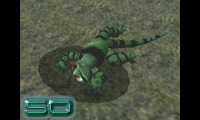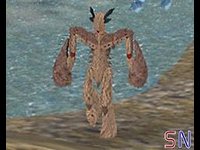|
|

|
PLATFORM
|
Dreamcast
|
BATTLE SYSTEM
|

|
INTERACTION
|

|
ORIGINALITY
|

|
STORY
|

|
MUSIC & SOUND
|

|
VISUALS
|

|
CHALLENGE
|
Moderate
|
COMPLETION TIME
|
Less than 20 Hours
|
|
OVERALL

|
+ Unique concept
+ Many things to be
- Tedious gameplay
- Random, uncertain part creation
- Slow, braindead battles
- No meaningful variation between areas
|
Click here for scoring definitions
|
|
|
Aside from E.V.O.: The Search for Eden, RPGs have avoided the theoretically fruitful ground of a creature slowly developing itself into something that dominates the food chain through a greatly condensed version of evolution. Released at the Dreamcast's Japanese launch, the title Seventh Cross Evolution picks up this idea and runs with it, but is quickly undone by myriad issues. Transforming from a defenseless one-celled organism into something able to effortlessly slay everything else in the environment should be a concept to engender a great game, but this one gets monotonous and stays that way.
The game begins with a primitive protist-shaped creature zipping in circles around a tiny pond, trying to eat things in order to grow while avoiding the deadly crabs that will kill it with their claws. Once the defenseless organism has ingested enough food to grow, which is fortunately a very quick procedure, it mutates into a strange brown thing. This Origin creature is still vulnerable to instant death by crab attack, but its gradual acquisition of resources via the killing of sea cucumbers and starfish will eventually allow it to plunge into deeper water and meet things more deadly than beach crustaceans.
Killing things grants evolution points, which are used at the monolith-shaped save points to create new parts. With the necessary number of points the player is able to draw pictures on a ten-by-ten grid, and the game judges what kind of part is created from this. There are some vague rules to the process, and generating a high level part becomes more likely after doing this for a while, but the procedure becomes boring very early and never gets more interesting. Since new parts are essential for progress along with improving the creature's base statistics simply by being created, the player will spend a long time at a dull task.
 What is that, my fiftieth finned lizard of the day? They breed like bacteria, gotta keep at it.
What is that, my fiftieth finned lizard of the day? They breed like bacteria, gotta keep at it.
|
|
Acquiring the evolutionary points is not much more interesting. Seventh Cross's combat system is the extremely basic setup of the creature trading blows with enemies until one side falls. Strategy is limited to using magical abilities at the right time, because dodging attacks is impossible. Even with such an unsophisticated battle mechanic, issues arise from the camera and random nature of the opposition. It is annoying that the game's camera feels the need to rotate 360 degrees every time the player-controlled creature uses a healing spell, but as there is no other way to quickly see if something is approaching from a different angle, the spinning view is necessary. Being able to see everything is vital because the game's enemies randomly spawn from the ground, and usually show up in a blind spot so the creature can be hit first. Later in the game, when the creature is able to survive multiple attacks without major injury, the monotony of killing the randomly spawning enemies for long stretches becomes even more pronounced.
The fun part of the game comes when new parts have been generated and ready to be applied. Arms are responsible for offense, legs determine mobility and are vital for moving out of the shallow pool in the game's beginning, bodies supply defensive upgrades, and heads allow more magic via their increased intelligence. Mixing and matching will produce some truly bizarre-looking creatures even if their core abilities aren't nearly as varied as physical appearance would suggest. The downside comes in the time that must be spent whacking enemies and doodling on the art grid to create the parts.
Seventh Cross handles being killed in an interesting way. Rather than subjecting the player to a Game Over screen, the creature is instead returned to the pool of the beginning with all statistic upgrades intact. Its current body parts are lost, but the blueprints to make them are not, with the caveat that these pieces require nutrients to generate. While the need to reacquire necessary resources may demand considerable extra killing of the local fauna, it at least prevents a moment's inattention leading to an irreplaceable loss. This is especially important because the game uses a whopping 170 bits of the 200 slots a Dreamcast memory card contains, preventing any backup save file from being employed.
 Anybody else thinking of Gary Larson's view of deer in this creature?
Anybody else thinking of Gary Larson's view of deer in this creature?
|
|
For almost all of its length, Seventh Cross Evolution has no plot whatsoever. Throughout the game's six areas the scenario of being a creature that fights the local fauna in order to become stronger never changes, and only a few glimpses of a malevolent angelic being doing the same thing hint at something more. Suddenly the finale presents genuine backstory, in a reveal that would be better via a different form of media. For a game that has had zero dialogue to pile it on at the end is an odd stratagem, and the information presented is not terribly revelatory in any event.
The six regions of Seventh Cross Evolution are visually distinct and manage to look noticeably better than those in comparable PlayStation titles of the late 90s. Their virtues are exhausted after saying that, because this game having come out at the beginning of the Dreamcast's existence ensured no time was available to polish the graphics into looking special. Each area may look different, but it functions in exactly the same way, plus the game has the gall to slow down in parts. As for the audio, some of the music is quite good, but a few areas with nothing but silence and certain annoying sound effects keep the whole auditory package unremarkable.
Among the first batch of Dreamcast software, Seventh Cross is at least moderately more interesting than Sting's Evolution and Climax's Time Stalkers. Its concepts would likely be worthwhile if revisited by another developer, but as the current game stands almost nothing is pleasant on a long-term basis. Its end is actually rather intriguing, but the experience of slogging through the mind-numbing game to get there is almost impossible to recommend. Intriguing ideas are not meshed with appealing execution, and by the end players will indeed feel as if they have borne seven crosses for an unpleasant length of time.
Review Archives
|









